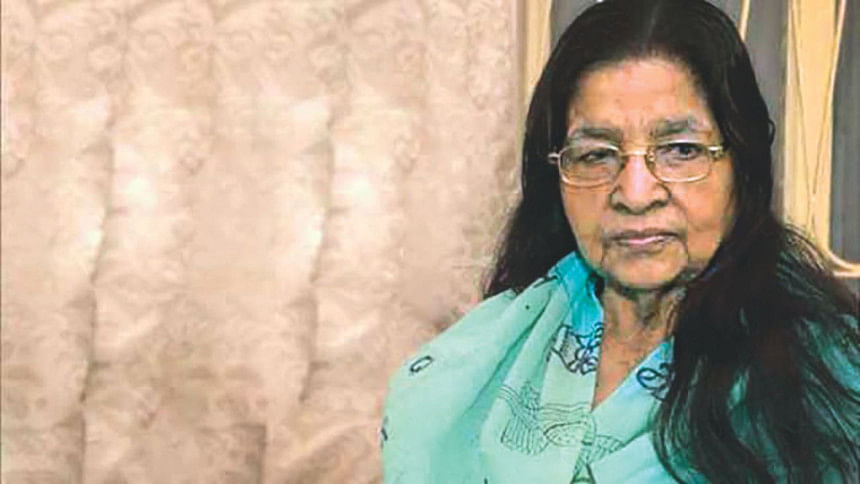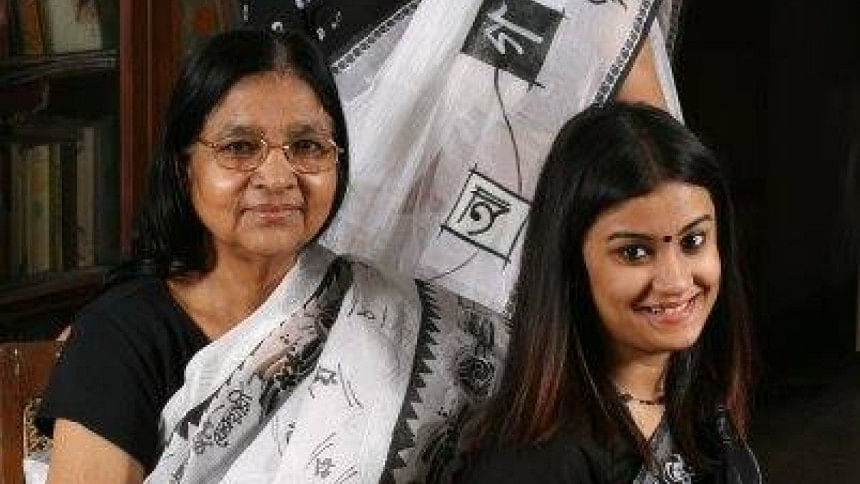Some Warriors Wear Saris

It isn't easy being the writer of the family, especially when your only competition is your grandmother who had written over 100 books in two different languages, like our legacy, our beloved Didu Dr Halima Khatun.
It isn't only her triumphs that she paved along the way, but the fact that she also managed to singlehandedly craft her only daughter, Pragna Laboni's successful life, is nothing short of amazing. The proof of her significance lies in the staggering number of "thank you" letters that continue to clutter up her desk to this day.
Born into a Muslim family on August 25, 1933, my grandmother had to fight patriarchy every day to accomplish her extensive list of achievements. After completing her Bachelor of Arts, she went on to receive not one but two Master's degrees in English and Bengali, but still felt like she should attain more. So her dedication for knowledge landed her in the University of Northern Colorado, where she got her PhD in Education in the year of 1966, which helped her gain the title as Director of Institute of Education and Research in Dhaka University.
Didu had a different take on life. Growing up, when my mother found out I enjoyed writing as a child, she made me promise that I would write something every week which only discouraged me and eventually, I stopped writing altogether. My grandmother on the other hand played a firsthand role in enhancing my writing skills. Her regular quizzing from the Reader's Digest "word power" section has surely proven to be useful, especially because I still seek out new words every day. Also, her delivery of silly puns or fancy limericks has helped me realise my love for clever comedy, as well as accept humour as an offset buffer every time life gives me lemons!
Whenever in her presence, I never felt as though I was learning something. What she did was make sure I got the most out of the environment by preparing the perfect atmosphere. As soon as my eight-year-old self would walk into her mystical kingdom, I would be greeted with the warmest welcome. It didn't matter that just last week I had broken her favourite vase which she bought from Moscow 20 something years ago, because this was truly a judgment-free zone.
When I announced that I wanted to write, Didu made sure there was a safe space. She would move all her important documents out of her sacred writing desk (which we were only to use when we clearly meant business). The holy table lamp would be turned on to make sure I was getting just enough light, so my baby eyes were never strained. She would bring out a crisp notepad from the hidden compartment underneath her magical desk. And then she would let me pick the neatest ballpoint pen with the sharpest tip, which produced strong yet delicate writing and made sure whatever content made its way into the milky white paper would be as bright as myself!
A dictionary was always close by, as were a number of flash cards just in case we needed guidance. Whenever Didu and I teamed up and started on our stories, even Tagore had nothing on us. And after all this, if I suddenly changed my mind and wanted to write on the walls instead, she would whip out colourful chalks in a heartbeat and the whole house became my canvas. The doors, the tables and the walls were covered with my squiggly handwriting as she marvelled at how the colours complemented each other.

That was just one of the few ways my grandmother had gone above and beyond in influencing me into the world of arts. In her presence, no error was considered an error because you could always learn from it and learning was pivotal.
Titles were not something that fascinated Didu, so her entire life had been dedicated to effectively making a difference in the world. She served as a Unesco consultant in Pokhara, Nepal in 1978 alongside visiting countries including Australia, Japan, Sri Lanka, Thailand, Philippines, Indonesia, South Korea and Fiji Islands as an active advocate for women's literacy as well as participating as a team member for training/teaching programmes in promoting primary education.
Didu was the grandmother who had read the entire Harry Potter series and considered herself mightier than Dumbledore. She made her own bags and started composting as a trend way before the Brooklyn hipsters were born. When she wasn't correcting doctoral theses or busy making sure the domestic help in our house were getting basic education, she was working on several projects at once, her latest being a Bengali-to-Sinhala dictionary.
Her other talents included being the most stubborn private tutor imaginable, the harshest publicist, the most intrusive doctor in all the land, our least favourite chaperone, as well as the famous cat whisperer. Limitless knowledge on almost any given subject was her expertise and her infectious thirst for learning is something that's been ingrained in everyone who had the pleasure of knowing her.
My grandmother, unlike many, knew exactly how to influence, guide and inspire those around her. Small acts such as the way she would bookmark articles or stories she thought I'd enjoy, or subscribing to teen magazines even when I was too busy spending time on the phone, eventually brought me back to my love for literature.
"Children do to society, what is done to them" said Dr Halima Khatun, language veteran of 1952, PhD holder, world traveller and a national treasure, but above all the matriarch of our family and my first best friend. She taught me not only my first alphabets but how to be kind to people and animals alike and just a mere personal narrative on a woman as massively brilliant, brave and bounteous doesn't even begin to sum up what it was like to be raised by such an all-rounder icon. She wrote for children, and thought for everyone, and as her granddaughter, all I can wish is to recognise and be grateful for all that is there to learn in this world and to never underestimate the power of education, so that her unparalleled guidance is not lost in vain.
Though my Didu may not be with me in physical presence today, on her birthday I thank her for being my reason to want to better myself every single day.
Anushua Arif is the granddaughter of Language Movement veteran Dr Halima Khatun.





Comments